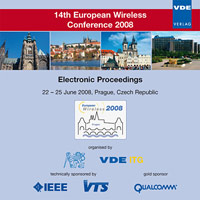Parallel Operation of Half- and Full-Duplex FDD in Future Multi-Hop Mobile Radio Networks
Konferenz: European Wireless 2008 - 14th European Wireless Conference
22.06.2008 - 25.06.2008 in Prague, Czech Republic
Tagungsband: European Wireless 2008
Seiten: 7Sprache: EnglischTyp: PDF
Persönliche VDE-Mitglieder erhalten auf diesen Artikel 10% Rabatt
Autoren:
Otyakmaz, Arif; Schoenen, Rainer; Dreier, Sebastian; Walke, Bernhard H. (ComNets, RWTH Aachen University, Faculty 6, Aachen, Germany)
Inhalt:
There are two basic duplexing schemes for present and future mobile radio networks, frequency-division duplex (FDD) and time-division duplex (TDD). In general each of these methods has its benefits and drawbacks. However, both schemes have their scenarios where they perform best. In future mobile radio systems typical wireless data communication will not only occur in metropolitan area scenarios like hotspots in airports, city centres, exhibition halls, etc., but also in wide area environments, e.g. a moving car in a rural environment. In general TDD is more appropriate for dense metropolitan area scenarios whereas FDD has benefits in wide area environments. If an FDD terminal which transmitted and received simultaneously, it would need an expensive duplex-filter, in order to separate UL and DL channels. Half-duplex terminals do not need such a filter. Therefore, half-duplex FDD appears to be attractive in terms of cost. A Relay is a promising concept for next generation systems. It allows enlarging the cell coverage range and is increasing the total cell capacity. A Relay is not connected by wire, but works in a decode-and-forward principle and consequently is a costefficient alternative to Base Stations. This paper introduces a protocol to support parallel operation of half- and full-duplex FDD terminals in a Relay capable system.


